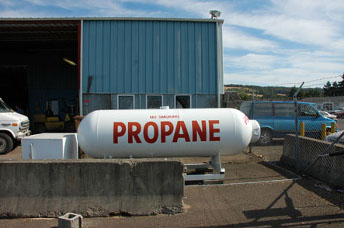Propane Safety Guidelines from McMinnville, Oregon
Your understanding of how to use your propane system safely will help your family and friends prevent accidents. McMinnville Gas Inc. Propane Gas Company in McMinnville, Oregon, offers propane safety guidelines.
Propane Safety Is Up to You
Propane is a safe, reliable fuel. Like many other fuels, however, it is flammable. That means it can be dangerous if not handled properly. In order to protect you, your family, and others, you must be aware of and respect the normal, everyday hazards around you. Propane gas is no exception.
A Pressure Situation
The propane in your gas system is stored under pressure, which is no problem. But, in the unlikely event your system develops a leak, which can be caused by physical damage or deterioration, propane can become dangerous.
Propane burns at an even rate when properly mixed with air, as in your stove or furnace. But if a leak occurs, a flame or spark could ignite it. If that happens, it could cause a fire or even an explosion. Although such accidents are rare, we want you to be aware of this possibility.
Know Your Propane System
Your propane system has four basic parts:
• A Tank or Cylinder, Equipped with a Main Shutoff Valve
• One or More Regulators, Designed To Reduce Pressure between the Container and Your Appliances
• Gas Piping, to Carry the Propane to Your Appliances
• Gas Appliances
The tank or cylinder is where the propane is stored. It is equipped with a shutoff valve, which turns the gas on or off. The regulator controls the gas pressure, while the gas piping carries the gas to your appliances. It is important for you to know the location of the main shutoff valve on the tank or cylinder. Remember its location and become familiar with how to shut it off in an emergency situation.
Contact us for assistance from our propane professionals.
At Home – Propane Safety
General Tips
To readily recognize a leak, know what propane smells like. Propane retailers have pamphlets available with a scratch-and-sniff spot so that your entire family can recognize the smell. Propane leak detectors, similar to carbon monoxide detectors, are available. See your propane supplier to obtain one.
If you smell a leak, immediately evacuate everyone from the building and call your local propane supplier or the fire department from your neighbor’s phone. Do not remain in the building, use the telephone or light switches or try to determine the source of the leak by yourself.
Be aware of where gas service lines are located, especially when working in your yard.
Water can damage the internal safety mechanism in the gas controls of an appliance. If you suspect that your appliance gas controls may have gotten wet (because of flooding, for example), have a trained technician replace them immediately.
Heating Appliances
All furnaces can collect lint and dirt and should be cleaned regularly. Contact your local propane supplier for information on proper cleaning, and follow the manufacturer’s instructions.
Water Heaters
Drain your tank periodically (until water runs clean – usually 2 to 3 gallons) to get rid of sediment buildup on the bottom of the tank.
Ranges
Have your unit serviced if the burner flame is not blue. The blue flame indicates complete combustion. A yellow flame means air inlets are clogged or burners need adjustment. Contact your propane supplier’s service department immediately.
Do not cover the oven bottom with foil – it can restrict air circulation.
Never use gas ranges for home heating.
Source: National Propane Gas Association/Propane Education & Research Council 5/1/02
Propane Grill Safety
Propane Grill Do’s:
Always use the grill outdoors in a well-ventilated area. Always follow all of the manufacturer’s instructions and keep written materials and manuals in a safe, accessible place.
Make sure the grill burner controls are turned off and keep the cylinder valve closed when not in use.
Make sure the gas grill is shut off and completely cooled off before covering it after use.
Always use or store cylinders in an upright, vertical position. Be sure to store them outdoors away from sources of ignition.
When you have your cylinder refilled, have your supplier check for dents, damage, rust or leaks.
After filling, take your cylinder home immediately. While transporting, keep your vehicle ventilated with the cylinder valve closed and plugged or capped.
After filling, take your cylinder home immediately. While transporting, keep your vehicle ventilated with the cylinder valve closed and plugged or capped.
When your grill is not in use, cover disconnected hose-end fittings and burner air intakes with small plastic bags, or obtain protective fitting caps from your propane supplier to keep out dirt, insects and moisture.
Before lighting your propane gas grill burner, use a leak-detection solution to check all connections for tightness. Contact your local propane gas supplier to obtain the leak-detection solution and instructions on how to use it.
If there is a significant and uncontrollable release of gas or fire, call the fire department immediately and move all people and pets away from the unit.
Propane Grill Don’ts:
Do not bring cylinders indoors or into an enclosed space such as a
garage.
Do not smoke while handling the propane cylinder.
Do not leave the cylinder in your vehicle.
Do not use matches or lighters to check for leaks.
Do not allow children to tamper or play with the cylinder or grill.
Do not use, store or transport your cylinder where it would be exposed to high temperatures. This includes storing spare cylinders under or near the grill.
Source: National Propane Gas Association/Propane Education & Research Council 5/1/02
